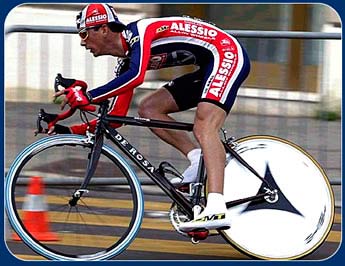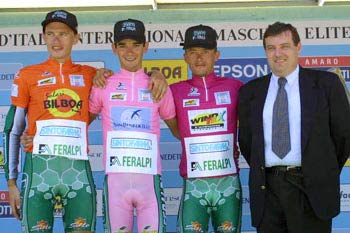 Davide Frattini Interview
Davide Frattini Interview
On a very hot Memorial Day last weekend, I braved the humidity, traffic (courtesy of Marco) and throngs of bike racing fans, and made it in one piece to the 64th year of the Tour of Somerville Criterium in New Jersey. There I tracked down, (with major assistance from Marco) and interviewed Italian pro and Colavita/Sutter Home team member, Davide Frattini. Frattini won the amateur (baby Giro) Giro in 2001 and has ridden in the Tours of California and Georgia, is twenty-eight years old and started out in cyclo-cross.
We sat on camping chairs and talked about the upcoming Tour of Ireland in August, growing up in Italy and making the transition to the United States, being a pro and coming from a family steeped in Italian cycling. Davide also introduced me to his girl friend and fellow racer, Kirsten Robbins who rode on the Canadian National Team.
Thanks toDavide for the English/Italian translation!
Cyclo-Cross with Colavita, 2006
O’Malley: What are your main strengths as a racer?
Davide Frattini: I’m a complete all-rounder and having come from cyclo-cross. I enjoy criteriums.
O’M: Did you know anyone here in the US? DF: When I first arrived, I shared an apartment with Todd Herriot, first time lived on 145th Street and Broadway, and then a couple of blocks south, somewhere in Harlem.
O’M: What part of Italy are you from?
DF: Varese ,its north of Milan and west of Lake Como.
O’M: What age did you get into racing?
DF: I start racing when I was 12 year old , then I was in the juniors and then under 23s for 4 years. In 2002 I became a professional and joined Team Alessio. I raced with teammates, Gotti and Pelizzotti and Dufaux.
 Frattini, TT when racing for Alessio
Frattini, TT when racing for Alessio
(TT prologo al Tour de Romandie)
O’M: What prompted you to come to the U.S?
DF: I had a bad crash and suffered from two squeezed vertebrae and it took a long time to recover. In Europe there are always younger guys coming through and there was no time for me to develop [training miles] after the crash. I didn’t find another contract with Alessio. I didn’t find and contract in Europe and didn’t want to ride for free. Other teams were offering less than the minimum.
O’M: And what was that minimum exactly?
DF: At that time was around 24,000 Euros
O’M: How did you end up living in the U.S?
DF: Well John Eustace found a contract for me with Webcor, but they signed Horner [Chris] instead. I joined Monex, just signed for experience and learn English.
O’M: You had no English when you got here?
DF: Just English from school.
O’M: What races did you do well in when you got here?
DF: The Vuelta Bisbee in Arizona and I won Captech in my third season with Colavita, in Richmond [VA] in 2006. I got fourth in Tour of Connecticut in 2005.
Winner, Captech, Richmond, VA 2006
O’M: What was your most memorable race as a professional?
DF: I think Captech. Because it was a crit and in the first 2 year in the States, coming from Europe I completely sucked in the crits! [Laughs] So it was nice after 3 year, see myself improve in the crits!
O’M: You constantly surprise yourself?
DF: Yes and that was my fourth year in the U.S and every year I get better and better. There are more crits here. In Europe and Italy there are much less crits. Also I did cyclo-cross and the intensity of cross is the same as crits. This helped me a lot.
O’M: What are your goals for 2007?
DF: I hope to do well in Philly week and all the summer [races]. I’m not a specific kind of racer, not fast enough, but when I’m in good shape I can get good results for the team. I can help my sprinter, Alejandro Acton [from Argentina]. Another one of our sprinters is Hayden Godfrey, from New Zealand. He’s recovering from surgery for arteries in his upper thigh. And we have Charles Dionne the Canadian sprinter, who won the San Francisco Grand Prix [2004] and used to ride for Saunier-Duval in 2006.
 Winner of Amateur Giro, 2001
Winner of Amateur Giro, 2001
(Vincitore Giro d’Italia Baby 2001)
O’M: Who was your bike racing hero growing up?
DF: My older brothers, Francesco and Michele Frattini. Francesco rode for Geweiss and then Telekom. Also, Gianni Bugno. He was always pushing a big gear and never showed when he was suffering.
O’M: How about way, way back?
DF: Chiappucci – I liked his style and he was also from near Varese, he was from Uboldo.
O’M: How about Pantani?
DF: I liked him too.
O’M: How big is cycling in Italy?
DF: Pretty big, not like in Belgium. After soccer it’s cycling.
O’M: Are there particular parts of Italy that lend to the popularity of cycling?
DF: Tuscany region there is a big cycling community. There are three main regions, Tuscany, Lombardy and Veneto.
 Italia, 2001
Italia, 2001
Frattini resiste sul filo dei secondi al vento dell’Est
e fa suo a Messina un Giro d’Italia Elite incertissimo
(Translation: Frattini resist for few second to the east Europe riders, and win the overall Baby Giro.)
This picture is from the last stage in Messina.
The guy on the left is Allan Davis, now on Discovery
O’M: Why is this?
DF: I don’t really know. All the pros came from one of these regions and the weather is pretty nice there. We have mountains and flats, just like California and Colorado. Nice training. Much better than Iowa or Montana [Laughs].
O’M: What do you eat before a race?
DF: In Europe I ate pasta (Colavita only), parmesan, mozzarella, prosciutto, but it’s difficult here in the States to ask the chef at the hotel/restaurant to make pasta four hours before a race, specially if the race start in the morning. I got used to eating oatmeal and cereals. It took a while to get used to oatmeal. Now I’m okay with Subway sandwich of prosciutto, ham and cheese. Colavita sends each rider [team members] gnocchi, cooking oil, pasta, olive oil and tomato sauce. Makes me feel like home [Laughs].
O’M: Where do you live now?
DF: Near Trexlertown, Pennsylvania.
O’M: Have you ever raced track?
DF: A little, when I was a junior I did team pursuit.
O’M: How much do you weigh?
DF: 139 pounds and five feet eleven inches.
O’M: How do you relax after a race?
DF: Basically I stay on the Internet, surfing and communicating with my family. I spend time with Kirsten [Davide’s girl friend and Advil-Chap Stick team member]. Kirsten reports on races for Cycling News.
O’M: Have you ever been to Ireland?
DF: No, but we [Colavita/Sutter Home Team] will be going in August for the Tour of Ireland. Seven or eight guys will be going.

O’Malley, the author with Kirsten and Dave
O’M: Do you drink beer?
DF: Yes blonde beers and light beers.
O’M: You came second in the Fall Bear Mountain in 2005. Tell me about that?
DF: Yeah, was second with a photo finish to Pulla [Melito Heredia]. He won by millimeters. I tried to drop him on the climb. In Bear 2006 [Spring] I was fourth, an early break go away with three other guys and when I move was to late to caught them.
O’M: What do you hope to do today?
DF: It’s flat like a pancake. So we’ll be aggressive.
O’M: Who are your major competitors today?
DF: Navigators. From my team Alejandro Acton will be the sprinter. I think Hilton Clarke, Aussie can win [He was the eventual winner, tipped one hour before the race by Davide].
O’M: How many more years do you hope to remain a pro?
DF: Maybe until 32 or 33, it depends. I wish always to find a nice team in Europe, but if I find a team here it’s ok. Here cycling teams are growing a lot. The gap between Europe and U.S is closer. There is more stage racing here every year. The calendar is getting bigger and bigger.
O’M: Why do you think this is?
DF: Lance has brought more fans. He made it more popular. If an American comes on the Tour, the idea of a compatriot winning makes it more popular [at home in America].
O’M: What about your winter training?
DF: The past two years I’ve been doing cyclo-cross and rode with the Italian national team. I was in Zeddam 2006 and Hooglede-gits in Belgium last year.
O’M: What kind of cross bike do you ride?
DF: It’s a Blue. They make cyclo-cross and road bikes.
O’M: Did you come from a family of cyclist in Italy?
DF: Well, my father was a part-time coach and worked at a hospital as a nurse. Both my brothers, Francesco and Michele were racers, eleven and nine years older then me. Francesco quit racing and has a bike company now, Dart Bikes, has a website, www.dartbike.com. Michele now works for the 911 in Italy, ambulance call receiver or dispatcher. My father coached my older brother and kids aged 7-10. He worked at the Hospital di Varese.
O’M: After you finish pro bike racing what do you hope to do?
DF: I went to school to be an optician. That can be an option. I’d like to open a restaurant or bar/coffee shop for cyclists. In Italy its not too often you see a coffee shop for cyclists. Like the one in Nyack [The Runcible Spoon]. The parking there is very good for bikes.
O’M: What can be done about the doping in pro racing?
DF: I’m from Europe and I’m used to hearing about this. Festina was the beginning. For me, people do what they want; but if they get caught they suffer the consequences. It’s all about business. All the jobs that involve big business and big money also involve the temptation for people to cheat. I like the idea of T-Mobile and CSC with programs inside the teams. These are the only two teams doing this. But they will need a lot of money to monitor their team and unfortunately lots of teams don’t have the money to monitor.
O’M: Why did you choose bike racing?
DF: Every Sunday in Italy parents went to races and watched my brothers racing. Soccer is less painful but more money [Laughs]. I like cycling because you suffer, but when you win you forget about the pain.
O’M: What the hardest race you’ve done?
DF: The San Francisco Grand Prix, 2003. I came in 11th and my right arm cramped from all the climbing. I had no energy left in my legs, had to push with my back and arms. The gradient was 18-20% in places and I had a 38-27 [chain ring was 38 teeth] on for the hills.
O’M: Did you have a mentor when you got to the U.S and what would you recommend for a crit, gearing wise?
DF: Mark McCormack, my ex teammate had on a 11-23-55. He was an older guy and had more experience, a big name in the U.S. He and Jonathan Page suggested that I do cross racing to help me with criteriums. His older brother Frank McCormack was the director of the team and was a good guy for advice. Mark is now a coach and races Masters/Elite. Frank quit and is a carpenter.
O’M: Thanks for your time. Good luck today and in Ireland in August.
DF: Ciao, thanks.
